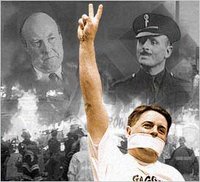New Start with Cameron?
cameroncampaign.org
For political parties, the election of new leaders can sometimes be a rather messy affair.
The Conservative Party in the UK hasn't been spectacularly succesful in chosing its leaders during the last decade. The individuals that have been there with obvious leadershipb potential - a Kenneth Clarke, a Michael Portillo - have all been sidelined, and one has ended up with individuals that have all been heading for failure.
There are numerous reasons for this, but one has been the split in the party over the issue of Europe, and the obsession of its more nationalist wing with getting anti-Europeans to the top and putting this issue forward as one of the most important.
British public opinion might not be the most enthusiastic on European issues, which is hardly surprising if one sees the vitriolic anti-Europen line taken by some of the key media of the country. But they do not want to see their country isolated in Europe, and they don't want antik-European sentiments to dominate the politics of their country.
Accordingly, the strident anti-European line has taken the Conservative Party from the one failure to the other.
Now it's in the middle of a new leadership selection process. It's an elaborate affair. First, a series of votes among the Members of Parliament produced a list of candidates that was eventually narrowed down to two. And now the 300 000 members of the party will vote by ballot in order to choose between these two. The winner will be announced on December 6.
The clear frontrunner at the moment is David Cameron. Young, untested and open on most issues, he seems to embody the hopes for a fresh start. He's seen as the Conservative version of what Tony Blair once brought to a Labour Party going nowhere.
On Europe, David Cameron is more open than most. It's simply not been that much on his agenda. But there is no reason whatsoever to believe that he will portray the party as negatively on these issues as some of his successors have done.
On Thursday of the coming week the two contenders David Cameron and Dave Davis are scheduled to meet directly in a TV duel. That's a first in British politics where duels of this sort don't even happen in general elections.
At the moment it looks as if David Cameron has established a solid lead in the campaign. We'll see if that duels will change the situation.
But all together there seems to be an element of new life in and new hope for the Conservative Party.
If nothing else, then the United Kingdom at the very least needs a better opposition.







